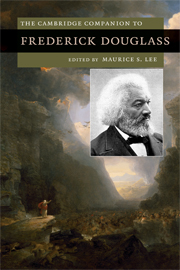Book contents
- Frontmatter
- Introduction
- 1 Douglass’s Self-Making and the Culture of Abolitionism
- 2 Identity in the Autobiographies
- 3 Douglass as Orator and Editor
- 4 Crisis and Faith in Douglass’s Work
- 5 Violence, Manhood, and War in Douglass
- 6 Human Law and Higher Law
- 7 Sentimental Douglass
- 8 Douglass among the Romantics
- 9 Douglass’s Black Atlantic: Britain, Europe, Egypt
- 10 Douglass’s Black Atlantic: The Caribbean
- 11 Douglass, Ideological Slavery, and Postbellum Racial Politics
- 12 Born into Slavery: Echoes and Legacies
- Guide to Further Reading
- Index
10 - Douglass’s Black Atlantic: The Caribbean
Published online by Cambridge University Press: 28 July 2009
- Frontmatter
- Introduction
- 1 Douglass’s Self-Making and the Culture of Abolitionism
- 2 Identity in the Autobiographies
- 3 Douglass as Orator and Editor
- 4 Crisis and Faith in Douglass’s Work
- 5 Violence, Manhood, and War in Douglass
- 6 Human Law and Higher Law
- 7 Sentimental Douglass
- 8 Douglass among the Romantics
- 9 Douglass’s Black Atlantic: Britain, Europe, Egypt
- 10 Douglass’s Black Atlantic: The Caribbean
- 11 Douglass, Ideological Slavery, and Postbellum Racial Politics
- 12 Born into Slavery: Echoes and Legacies
- Guide to Further Reading
- Index
Summary
Frederick Douglass, over the course of his life, went from being a slave on US soil to being US consul in Haiti. That is to say, he went from being not even considered fully human according to US law to representing the US government in a foreign country. He is often thought of as the consummate exemplar of W. E. B. Du Bois’s notion of “double consciousness.” Douglass strove throughout his life to reconcile his affinity for the United States with the pain of being rejected by that nation because of his race. Du Bois, in fact, echoed the language of Douglass, who characterized African Americans as “a nation, in the midst of a nation which disowns them,” putting them in a position that is “anomalous, unequal, and extraordinary.” Douglass often spoke from both within and without America, insisting on his and his people’s rights as Americans while simultaneously describing them as “aliens … in our native land” and referring to Americans as “them.” As these tropes signal, Douglass’s internal conflicts manifest themselves strikingly in his writings about the world beyond the United States - especially about the African diaspora in the Caribbean. This population is crucial to examining the development of “Black” identities in the Americas in general, and to understanding Douglass’s mindset in particular, because they constitute such a substantial proportion of the African-descended population of the “New World.” Historians calculate that of Africans brought as slaves to the Americas, 95 percent were brought to South America and the Caribbean and only 5 percent to the United States. Many African captives eventually transported to the United States were “seasoned” - meaning acclimated to enslavement - on Caribbean soil before they were taken to the United States for sale.
- Type
- Chapter
- Information
- The Cambridge Companion to Frederick Douglass , pp. 146 - 159Publisher: Cambridge University PressPrint publication year: 2009
- 13
- Cited by



